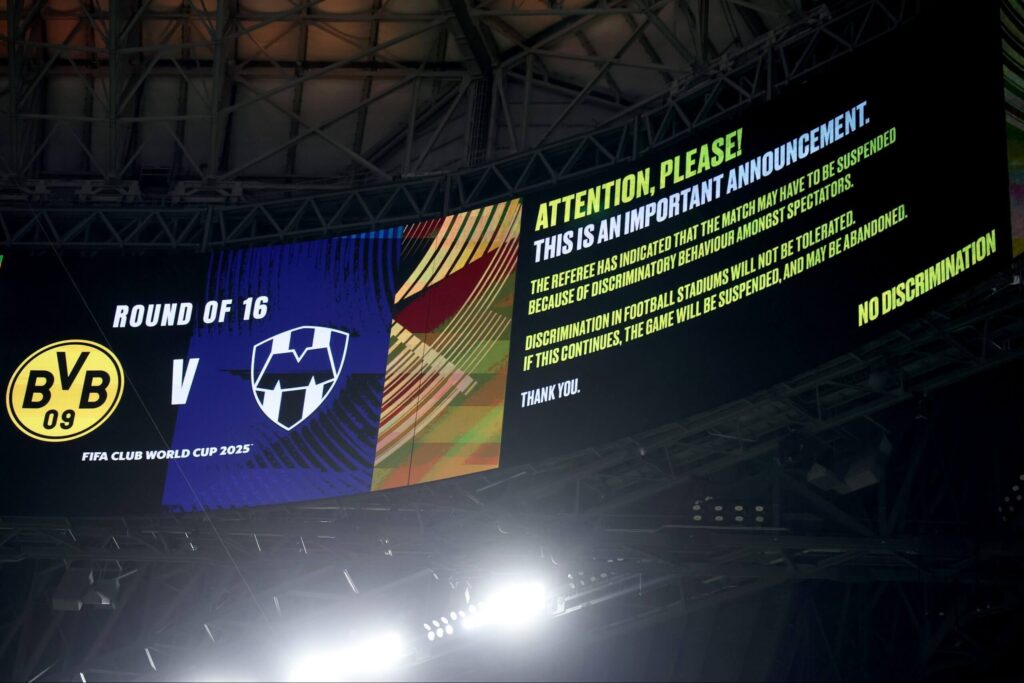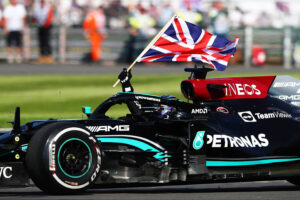
Supporters at Monterrey’s Club World Cup last-16 game against Borussia Dortmund were cautioned by FIFA after homophobic chants echoed through the Mercedes-Benz Stadium in Atlanta. The chants, heard during the second half, threatened to overshadow Dortmund’s 2-1 victory, as FIFA officials warned that the match could be suspended if the behavior continued.
The incident unfolded as Dortmund goalkeeper Gregor Kobel prepared to take a goal kick, prompting a section of the crowd to chant a discriminatory slur. This chant, unfortunately, has become a notorious fixture in Mexican football culture. Despite Dortmund’s commanding 2-0 lead at half-time, the atmosphere soured as the chants grew louder with each of Kobel’s goal kicks.
FIFA’s Response and Protocols
FIFA confirmed its awareness of the situation during the match, displaying a stern warning on the stadium’s big screen. The message indicated that the match could be suspended or abandoned if the discriminatory behavior persisted. According to a FIFA representative present, there is a protocol designed to address such incidents, empowering referees to take escalating actions against discriminatory fan behavior.
This protocol is part of a new disciplinary code implemented for the Club World Cup. However, FIFA has faced criticism from anti-discrimination campaigners for its decision not to regularly display anti-racism messages during the tournament in the United States. This marks a departure from previous tournaments, such as the Women’s World Cup in 2023 and the men’s World Cup in 2022, where such messages were prominently featured.
Historical Context and Ongoing Challenges
The homophobic chant, often directed at goalkeepers during goal kicks, has deep roots in Mexican football. Despite various efforts to eradicate it, including campaigns by the Mexican Football Federation (FMF) and CONCACAF, the chant persists. The FMF, alongside Soccer United Marketing and CONCACAF, has launched public awareness campaigns like “What’s Wrong is Wrong,” but results have been mixed.
FIFA has previously fined the FMF and imposed stadium bans due to the chant. The issue is not confined to international matches; it has also been reported in Liga MX and MLS games. In 2025, San Diego FC’s inaugural home match was marred by the chant, despite the club’s efforts to address the behavior with announcements in both English and Spanish.
Efforts and Implications
Efforts to combat the chant have seen varying degrees of success. LAFC, for instance, has managed to largely eliminate the chant from their matches through player and fan group initiatives promoting inclusion. However, the stigma remains, and with the 2026 World Cup set to be partially hosted in Mexico, the pressure to resolve the issue is mounting.
While it is unfair to label all Mexican fans as participants in this behavior, the actions of a vocal minority continue to cast a shadow over the fanbase. Until there is a significant reduction in such incidents, the stigma will persist, potentially impacting the perception of Mexican football on the global stage.
“Attention please! This is an important announcement. The referee has indicated that the match may have to be suspended because of discriminatory behaviour amongst spectators. Discrimination in football stadiums will not be tolerated. If this continues the game may be suspended or even abandoned.”
As FIFA grapples with these challenges, the organization has yet to comment on whether the current political climate in the U.S. influenced its decision to scale back anti-discrimination messaging. The situation underscores the ongoing struggle against discrimination in sports and the need for continued vigilance and proactive measures.






